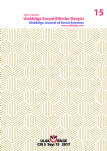KIRDAN KENTE GÖÇÜN KÜLTÜREL SONUÇLARI: GECEKONDULAŞMA VE ARABESK
THE CULTURAL RESULTS OF THE IMMIGRATION FROM RURAL TO URBAN: SQUATTING AND ARABESQUE
Author(s): Cansu KaymalSubject(s): Cultural history, Political history, Government/Political systems, Rural and urban sociology, Sociology of Culture, Post-War period (1950 - 1989), Sociology of Politics
Published by: Sanat ve Dil Araştırmaları Enstitüsü
Keywords: Immigration; squatters; arabesque; arabesque culture;
Summary/Abstract: Arabesque, which means “Arabic style”, “something in Arabic style”, has emerged as a result of some interwinted processes in Turkey. One of these processes, is the reaction of people with orientalises against the government’s westernization policies in the early periods of the Republic. The other is, as the results of the immigration that began in 1950’s from rural to city, the economic based depression, such as unemployment, lack of housing in cities and culture based depression that experienced to adapt to the urban environment. The purpose of this article is to examine the processes that have led to emergence of arabesque and it’s acceptance of wide segment of the society in the context of the migration, squatting and the government politics. When these processes evaluated together, it can be said that, arabesque is the result that emerged by the government, while trying to reach the its aims such as westernization, modernization, industralization and urbanization. In this article, the emergence of the arabesque, the meanings that it implies, the style and how this style is reflected in arabesque products and the change of arabesque in time will be explained by using the content analysis method and to give examples from some arabesque lyrics.
Journal: Ulakbilge Sosyal Bilimler Dergisi
- Issue Year: 5/2017
- Issue No: 15
- Page Range: 1499-1519
- Page Count: 21
- Language: Turkish

